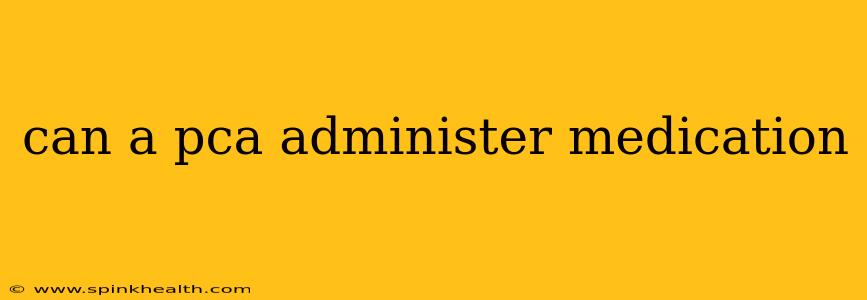Can a PCA Administer Medication? The Complexities of Patient Care
The question of whether a personal care assistant (PCA) can administer medication is a crucial one, fraught with legal and ethical considerations that vary significantly by location and specific circumstances. The short answer is: generally, no, unless specifically trained and authorized. Let's delve into the nuances.
It's a story of responsibility, regulations, and the delicate balance between providing assistance and ensuring patient safety. Imagine Sarah, a dedicated PCA caring for Mr. Jones, a senior with several medical conditions. He needs help with daily tasks, but also requires regular medication. Can Sarah simply give him his pills? The answer depends on a multitude of factors.
What Tasks are PCAs Typically Allowed to Perform?
PCAs are generally trained to provide non-medical assistance. Their role centers around assisting individuals with activities of daily living (ADLs). This often includes:
- Personal hygiene: Bathing, dressing, grooming.
- Mobility assistance: Helping with transferring, walking, using assistive devices.
- Meal preparation and feeding: Assisting with eating, preparing simple meals.
- Light housekeeping: Tidying up, laundry.
- Companionship and social interaction: Providing emotional support and engaging in activities.
Medication administration is explicitly outside these typical duties. It requires specialized training, licensing, and often direct supervision by a healthcare professional.
What are the Legal and Ethical Implications?
The legal framework surrounding medication administration varies considerably from state to state and even between countries. In most jurisdictions, administering medication without proper authorization is illegal and could lead to serious consequences, including legal action and loss of employment.
Ethically, the primary concern is patient safety. Incorrect medication administration can have severe, even life-threatening, repercussions. PCAs lack the medical expertise to assess potential drug interactions, monitor side effects, or make adjustments based on a patient's changing condition.
Can a PCA Ever Administer Medication?
There are exceptions. Some jurisdictions may permit PCAs to administer medication under specific circumstances:
- With explicit authorization: A doctor's order clearly stating that the PCA is authorized to administer specific medications under strict supervision and with detailed instructions.
- After specialized training: Some states offer specialized training programs for PCAs enabling them to administer certain medications under controlled conditions. This usually involves ongoing supervision and regular checks.
- Limited scope of practice: The medication might be very simple, like over-the-counter pain relievers, and the administration is closely supervised by a healthcare professional.
What Happens if a PCA Administers Medication Without Authorization?
This can result in significant legal and professional consequences, including:
- Criminal charges: Depending on the severity of the situation and any resulting harm, criminal charges could be filed.
- Civil lawsuits: The patient or their family could sue the PCA and their employer for negligence.
- Loss of employment: The PCA would almost certainly lose their job.
- Revocation of certification or license: If the PCA holds any relevant certifications or licenses, these could be revoked.
What are the Alternatives to PCA Medication Administration?
If a patient requires medication administration, alternative solutions must be found. These might include:
- Home health aides: These professionals are trained and licensed to administer medications.
- Family members: Family members might be trained to administer medications, but this requires thorough instruction from healthcare professionals.
- Professional nurses: Nurses can provide regular medication administration as part of their duties.
In conclusion, while PCAs provide invaluable support to individuals requiring assistance with ADLs, medication administration is generally outside their scope of practice. The potential for legal and ethical violations, combined with the significant risks to patient safety, makes it crucial to strictly adhere to regulations and utilize appropriately trained healthcare professionals for medication management. Always consult with medical professionals and relevant authorities to determine the legal and ethical requirements in your specific location.

